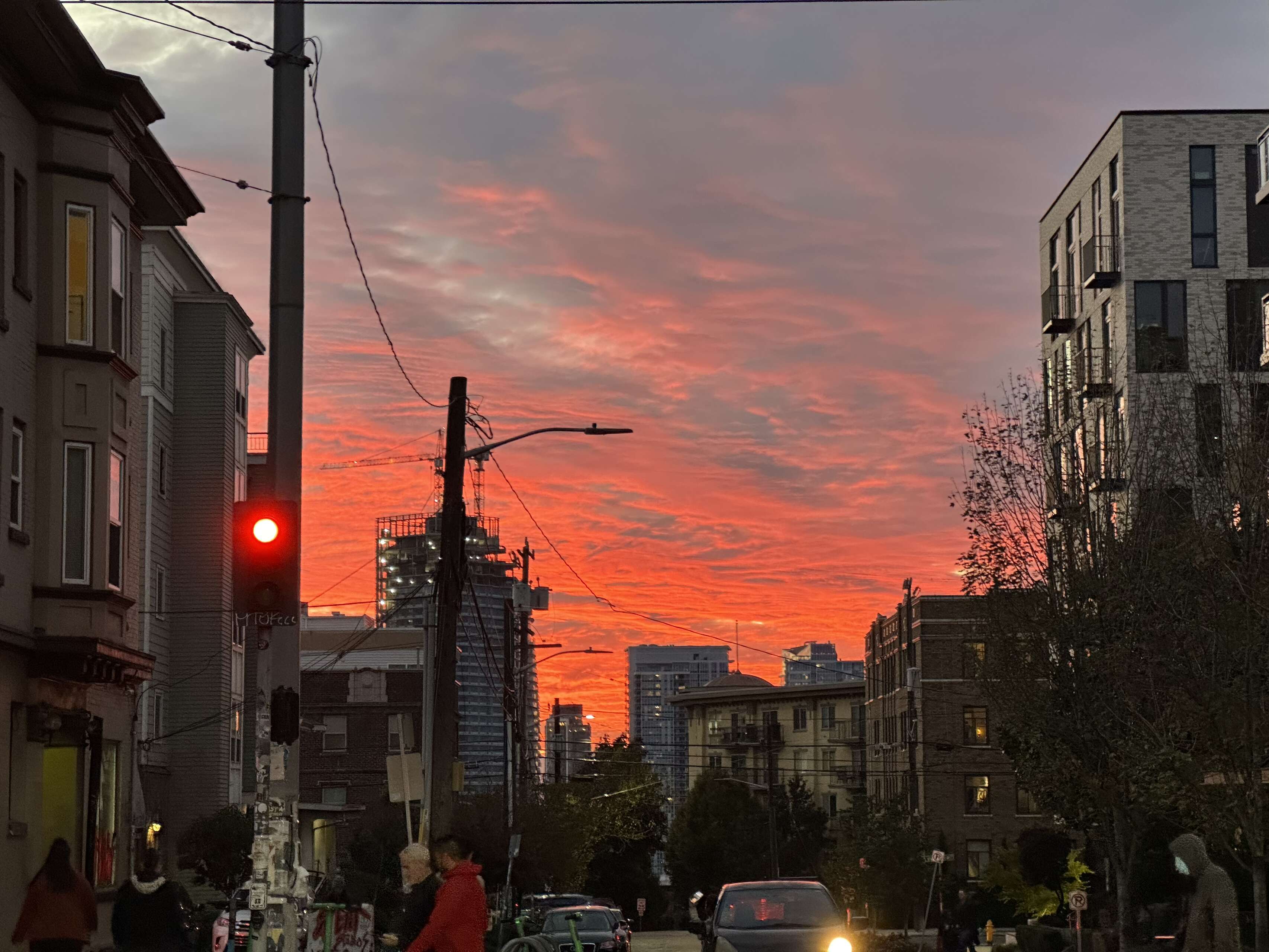I won’t say I’ll never need a break again or that I’ve got everything figured out now, but I upgraded the materials paving my road ahead. And I finally feel comfortable moving forward.
A scenic waterfall in Redmond, WA
It pains me to say that I was equally as afraid of success as I was of failure.
Success equals more work, more accountability, and more responsibility. (In good hands, of course.) Success means there are more eyeballs watching one's every move, which would also leave someone more open to criticism—a trauma-trigger of mine.
And that's scary. Sometimes I don’t know from one day to the next if I'll be able to manage more, let alone simply get out of bed and be able to do anything more than my skincare routine in a day.
And that's scary. Sometimes I don’t know from one day to the next if I'll be able to manage more, let alone simply get out of bed and be able to do anything more than my skincare routine in a day.
I found myself writing in a way that anticipated potential criticisms and questions, and I would combat or answer them before anyone could even ask or engage with me.
Looking back, I also focused on writing to people who required convincing—oppositional thinkers, contrarians—unintentionally overlooking those who would actually be served by my self-exploration.
But, the worst offense of all: I stopped writing for me.
In part, as an Autistic person in a neurotypical world, we're on-guard against the judgment of others the majority of the time. That affects our ability to make decisions and simply to go about our day-to-day lives in a healthy way.
Looking back, I also focused on writing to people who required convincing—oppositional thinkers, contrarians—unintentionally overlooking those who would actually be served by my self-exploration.
But, the worst offense of all: I stopped writing for me.
In part, as an Autistic person in a neurotypical world, we're on-guard against the judgment of others the majority of the time. That affects our ability to make decisions and simply to go about our day-to-day lives in a healthy way.
The other part is that I was eager to learn to communicate (better) with opposing viewpoints. But it became habitual to a point that it hijacked my entire writing process.
My new path ahead will focus on writing works that I love and can be proud of, ignoring the little contrarian in my head until his words become a whisper, eventually dying out.
I can always summon necessary, anticipated questions (sans criticisms) that can bolster a piece during the editing process, but not while writing. Meanwhile, my inner perfectionist, needing to get things "just right" before I can release anything, can go right ahead and fuck off.
• • •
My new path ahead will focus on writing works that I love and can be proud of, ignoring the little contrarian in my head until his words become a whisper, eventually dying out.
I can always summon necessary, anticipated questions (sans criticisms) that can bolster a piece during the editing process, but not while writing. Meanwhile, my inner perfectionist, needing to get things "just right" before I can release anything, can go right ahead and fuck off.
• • •
Like most late-diagnosed Autistic adults, we tend to mine our pasts trying to find early signs of Autism that were missed, or simply to view the ways we acted and reacted to things through a new, more compassionate lens. Revisiting our former selves in our minds—versions of us that we may have been just as critical of as our critics were at the time—with this newfound recognition and empathy, the past changes shape before the mind's eye.
But, this too became an addiction—one I could tap repeatedly to produce new content for my former blog, and to provide more things to talk about with my therapist. However, in doing so, I continuously drummed up pain, only adding to the daily struggle I dealt with already.
And although I wouldn’t say it was a waste of time to explore the why behind much of what I’ve done and experienced, not everything has such a clear-cut reason for being.
Soon, I found myself obsessively needing to find answers and root causes to everything. But, it took nearly 38 years to get to this point in my life. How long will uncovering “all” of the answers and roots take? And will I be any better off spending all of that intentional time on the past while the present passes me by?
And although I wouldn’t say it was a waste of time to explore the why behind much of what I’ve done and experienced, not everything has such a clear-cut reason for being.
Soon, I found myself obsessively needing to find answers and root causes to everything. But, it took nearly 38 years to get to this point in my life. How long will uncovering “all” of the answers and roots take? And will I be any better off spending all of that intentional time on the past while the present passes me by?
I focused so hard on what happened before, not recognizing that parts of the past always come back to me when I'm actually ready for them.
Many times Brian will tell me something with such certainty. I’ll hear him, even if I didn't acknowledge him as well as I probably should. Then, sometimes months or even a year or more later, a friend or mentor will tell me the same thing or something similar, but only then does it truly sink in. I’ll go back to Brian with this newfound personal enlightenment, and understandably frustrated, he’ll say, “I told you that [months] ago!” He’d feel unheard, disregarded, or invalidated. But what actually happened was that I wasn’t ready for the information when it first entered my brain.
I wasn’t ready for much of what I was taking in, and my obsessive researching and internal excavating took me too far ahead of my processing capabilities at the time.
I needed to pause and stop reporting in realtime on every step like I’d been doing for a few years. Furthermore, I was writing "under a microscope" when likely everyone reading, including myself, would be better served by some distance and time.
But as my other obsessions have revealed after taking a step back, it’s easy for me to gently stumble into a topic or project I’m excited about, then it snowballs into being the only thing I can focus on.
• • •
But as my other obsessions have revealed after taking a step back, it’s easy for me to gently stumble into a topic or project I’m excited about, then it snowballs into being the only thing I can focus on.
• • •
With Life and Other Stories—with its now pruned and refined archive—writing about neurodivergence in realtime while mining the past seemed to become an arm of my personality. I felt stuck. Then, as my health conditions worsened, that became the new thing that took hold of my attention, and the obsession with understanding it all both seemingly contributed to my further decline.
My almost 8-month hiatus gave me perspective.
I’m grateful for the sales of my planner, for my Patreon and former Life and Other Stories paid subscribers, and for Brian for supporting me through the much-needed step back.
During my time away, I learned even more which I’ll share about soon, I reduced my weekly therapy sessions to once every three weeks (to avoid drumming up pain unnecessarily, and because I was ready to cut back), and I’ve returned refreshed with the firm understanding that I easily become fixated on things. I’ve learned how to plan and, now, how to work in a way that honors and better manages these acknowledgments, and I’m excited to share my tidbits with you as we go.
Moving forward, my main focus will be on writing and submitting short fiction and personal narrative essays to other online and print publications, then collecting those published stories here.
This blog/newsletter will feature:
This blog/newsletter will feature:
- [brief] musings
- the occasional life and writing/project update
- any “nuggets of wisdom” I uncover
- and recommendations I think you’ll enjoy
This newsletter will be sporadic. As I shared in my final Life and Other Stories post, my fixation with making that platform work, partnered with life as a chronically ill, neurodivergent person with a family and other responsibilities meant that writing that newsletter while trying to "hack" Substack was all I was able to manage.
Overall, I’m doing much better now, but even so, I would rather not backslide again if I can help it.
During the latter part of my break, I finally redesigned my website using Publii—a desktop-based (higher security), open-source static website builder.
I also reviewed all of my published pieces, edited those I was able to, and refined, updated, and still found pride in the work I've written over the past few years. Some of the pieces I enjoyed revisiting most are:
- fitting in at what cost? (2021), a personal essay on masking as a late-diagnosed Autistic adult, on Hey, World!
- Silently Saying Goodbye (2023), a personal essay on adult friendships (in the transient city of Seattle), on Life and Other Stories
- Open (2024 update), a short fiction piece from the fresh perspective of a woman in an open marriage she may or may not have consented to, on Patreon
- But You Don’t Look Autistic (2022), an essay on my Autism diagnosis, including resources for individuals who suspect neurodivergence in themselves or their children, on Invisible Illness
- reclaiming stolen time (2024 update), a musing about adjusting to life after a dramatic change, on Hey, World!
- 18 Years Later (2023), a personal narrative essay on the death and post-recovery after a pivotal loss of a beloved family member, on Life and Other Stories
I’m excited about the changes and journey ahead, and I'm glad you're tagging along.
All the best,
offer ongoing support and | become a Patreon patron
get the | Content Strategy Planner
visit the website | segwrites.com
P.S. I predominantly write from my personal experience as an Autistic person with ADHD, chronic illness, Anxiety, and more. Each of these factors can influence my individual experience overall, as well as my experience of each condition.
What I share is not a substitute for medical advice.
Self-identification of Autism (what many call “self-diagnosis”) is perfectly valid. If a personal Autistic experience I write about resonates deeply with you, consider these resources on Embrace Autism (starting with the Autism Quotient Test) as a first step. If professional assessment is important to you or your life has been impeded enough that you may need to qualify for Disability, you can print your results to bring to a diagnostician. (Having all those tests completed in advance saved me a lot of money!) Although there are many more diagnosticians available, here is a comprehensive list to get you started.
Lastly, some of my opinions may have changed since I first wrote this.
Hit reply with any questions, and I’ll respond as soon as I can.

